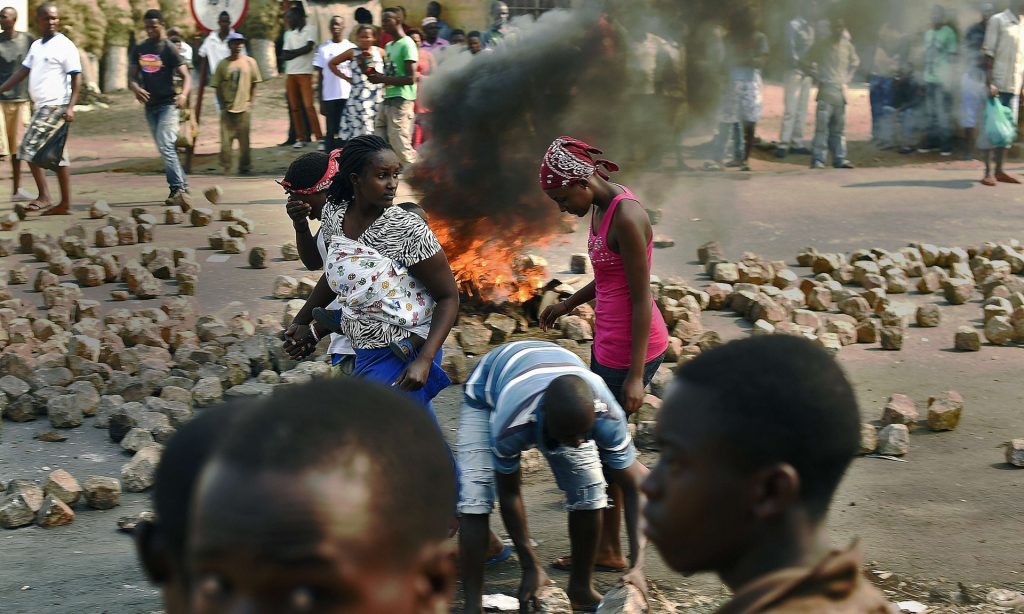
Photograph: Carl de Souza/AFP/Getty Images
After more than a year of turmoil, Burundi is suspended in a “fake calm” with risks of further instability exacerbated by an economic slowdown, regional tensions and destructive ethnic rhetoric, a British parliamentary committee has heard.
Human rights and aid experts painted a chilling picture of a state ruled by fear, where authorities have become increasingly sophisticated in concealing repression and where high inflation, flooding linked to El Niño, and the political crisis have conspired to make it harder than ever for most people to make ends meet.
During its session on Burundi, the International Development Committee (IDC) heard that the UK’s priorities include supporting hobbled peace talks in Tanzania and pushing at the UN for the deployment of an international police contingent.
In April last year, President Pierre Nkurunziza declared he would stand for a third term, triggering street protests, a failed coup and months of terror during which, human rights activists say, scores were killed or abducted and tortured by intelligence services. More than 285,000 people have fled to neighbouring countries.
On Wednesday, a former government minister and BBC journalist, Hafsa Mossi, was shot dead in Burundi’s capital, Bujumbura, by unknown gunmen – the latest in a series of apparently politically motivated assassinations. Nkurunziza said the murder was a “vile and cowardly act”.
In her testimony, Carina Tertsakian, a senior researcher at Human Rights Watch, said: “The government of Burundi has shown no sign of relenting and the repression towards anyone suspected of being an opponent or critic is absolutely brutal,” citing a recent HRW report.
“Some of the torture techniques that we have documented are so vicious it’s unbelievable that anyone survives: for example, intelligence agents use metal bars, hammers to smash people’s bones, to smash their jaws, pulling out their teeth with pliers, tying ropes to the genitals of male detainees and pulling them, and other acts of torture that are just horrific. For these abuses, there is complete impunity,” she said.
Richard Moncrieff, project director for central Africa at the International Crisis Group, said Nkurunziza’s government had become increasingly radicalised while stop-start peace talks were unlikely to succeed, not least because of the fragmentation of the opposition.
“I would describe the situation as a fake calm,” Moncrieff told the panel of MPs, describing a toxic “ethnicisation from above” that he said had yet to take hold in the general public or in the army but was present at the top levels of government, and among the ruling party’s armed youth wing, the Imbonerakure.
Although this latest crisis is political in origin, there is concern it could revive the divisions of a 12-year internal conflict, during which 300,000 people were killed as Hutus rebelled against the Tutsi-dominated armed forces.
“The regime is trying to push the ethnic card to shore up its support among its core supporters, its Hutu supporters but also in the security forces … All the evidence shows that the general population is quite resistant to that … But we see that the police and … the Imbonerakure are clearly using ethnic rhetoric … we see top levels of government continuing to use very unpleasant ethnic rhetoric,” Moncrieff said.
“This poses a very serious threat to long-term social cohesion and an immediate threat to the stability of the country … because the poisoning of the atmosphere in this way, when it enters the security forces and informal militia … can have catastrophic consequences.”
In January, the UN warned that “a complete breakdown of law and order is just around the corner” and said it was investigating allegations of gang-rapes, enforced disappearances and the digging of mass graves during an eruption of violence last December.
Nick Hurd, Britain’s minister for international development, said the UK government was putting diplomatic pressure on players to attend peace talks.
“There’s a process under way that is frustrating and slow. We’re a player in that and also through the UN, we’re working those channels to keep the focus on this situation, not least to get agreement on the police contingent we’d like to see deployed,” Hurd said, adding that one problem was the need for approval from Burundi’s government, which reportedly opposes the UN deployment.
Benjamin Chemouni, of the London School of Economics, said Nkurunziza’s administration was becoming more professional in its repression. “They are much better in targeting people and doing that behind closed doors,” he said.
In June, Zeid Ra’ad al Hussein, the UN high commissioner for human rights, said there had been at least 348 extrajudicial killings in the year to April, and he spoke of a climate of fear.
There are reports (pdf) that Burundians are being recruited in refugee camps in Rwanda to join anti-government militias.
“If Rwanda is training people in camps, that would give the regime in Bujumbura a reason to say, ‘Look, these people are just puppets of a Tutsi government’, and then it would give them a base for having this inflammatory rhetoric of ethnicity,” Chemouni said.
Hurd said: “We have sent very clear signals to Rwanda that we want their interventions in this situation to be constructive.”
The expert panel called for sanctions on hate speech, an international inquiry into crimes, the deployment of the police contingent and greater support from donors.
The IDC’s chair, Stephen Twigg, said strong action was needed from bilateral partners, including the African Union and the UN, to prevent further violence, adding: “We must not let this quiet crisis fall off the international agenda.”

